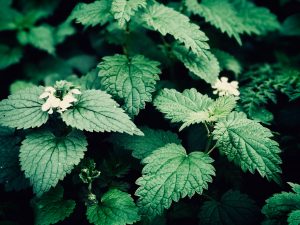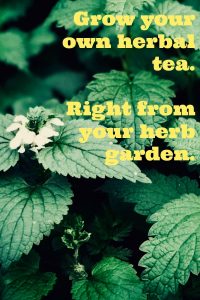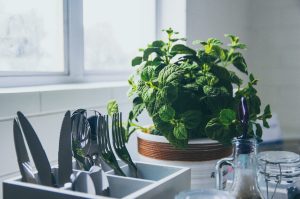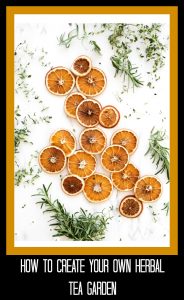When the summer is in full swing and the harvest picks up, I often don’t know what to do with myself. I have a productive vegetable garden and a few fruit trees that I don’t want to see going to waste. This keeps my evenings full of processing – peeling, washing, pitting.
RELATED POST: Grow Your Own Headache Cures in Your Herb Garden
Every summer there comes a time when I feel like I’ve had enough. But on the bright side, every winter comes a time when I’m really thankful that I did do all that work. There is nothing more satisfying than sitting down to breakfast with pancakes topped with your own jam, or a steak dinner garnished with your own pickles, or pickled green tomatoes.
Tea Garden
Most recently, I added another task to my already busy schedule: drying teas. I know I’m crazy. But this past winter was the first one I spent with a mug of my own herbal tea and I’m not going back. Why?
Because it tastes like my garden when the weather outside is horrible and cold, and it’s not the season for anything in particular. So I curl up with a good book and a pot of fragrant mint tea and automatically start planning for next year.
If jams, jellies, and pickles are meant for fast and immediate satisfaction, then teas are for the more meditative and thoughtful enjoyment of the fruits of your labor.
The plants I started growing for tea include chamomile, mint, peppermint, dandelion (alright, so I didn’t grow it on purpose, but now I wait a while before ripping it out of the ground!), nettles, blind nettles, plantain and rose.
Now bear with me. Because most of the plants I mentioned most consider weeds. But this doesn’t mean they’re not good for you and good for tea. So put that weed killer away – your garden and your pantry will thank you.
I will include the recipe for the weediest weed of them all: dandelion. Hey, imagine a tea like this being actually sold in online tea and coffee store and in herbal stores! You have a treasure at your arm’s reach.
Dandelion Tea
How and when to pick:
Pick the flowers when they have just bloomed. Most of them in the early spring. This not only makes delicious tea but prevents them from spreading all over your garden. I dry them in a dehydrator. You can also spread them on a baking pan and dry them on a low setting with the oven door open.
Harvest dandelion roots in the fall. They are not as bitter when you harvest them in the spring. Wash them very meticulously, then dry them using the same method as the flowers. The root can be made into tea later by simmering it in on a low heat for 15 minutes.
This is a very healthy tea that is a very powerful detoxifier and antioxidant. Happy gardening!
Nettle Tea

Another plant that we consider a weed – but one which is absolutely full of benefits. It can lower blood sugar, blood pressure, and cholesterol. It helps to fight infections and decrease oxidative stress. Nettle is a strong diuretic. It contains vitamin C, Vitamin B, Vitamin K1, not to mention that 10 grams of nettle contain 290 milligrams of calcium and 86 milligrams of magnesium. Just to compare with the famed spinach – 10 grams of it contains 10 milligrams of calcium and 8 milligrams of magnesium. Eat that, Popeye! Bet you never knew that, did you?
It’s best to pick nettles before they flower. That’s when they’re at their nutritional best both for tea and if you’re planning on using them as vegetables. (Blanch them for stews and soups!). I keep them trimmed back all year long, so they have a chance to grow back and I can get multiple harvests in. No need to tell you to wear gloves.
Pick them and then dry in a warm place where there is free air movement, tied into bunches.
I often mix nettle tea with green tea – so I can mix the flavors and benefits of both. They go surprisingly well together, especially if you have a green tea with added fruit lie quinces, apples or oranges.
A few tips on tea storage:
Store your tea in an airtight jar. If possible, do not crush the tea. Because the stuff you get in tea bags is really inferior quality and turns to dust. Store the dried plants in large pieces if possible. This helps to retain their goodness and oils locked inside until you actually brew it. Before brewing, crush the leaves in the palm of your hand. You will get a very aromatic cup that smells like summer.
An important thing to remember is to make absolutely sure your herbs are dry before you seal them in a jar or an airtight bag. If there is any moisture they will develop mold – a very sad surprise if you’re looking forward to brewing a pot. I have learned the hard way.
The Takeaway: It’s Easy to Make Your Own Tea
I hope this article inspires you to take an appreciative look at the weeds in your garden and makes you think about how there is a use for everything. If you don’t want to go to the trouble of drying and packaging your own “weed” tea, you can get them in professional tea stores.





Comments are closed.